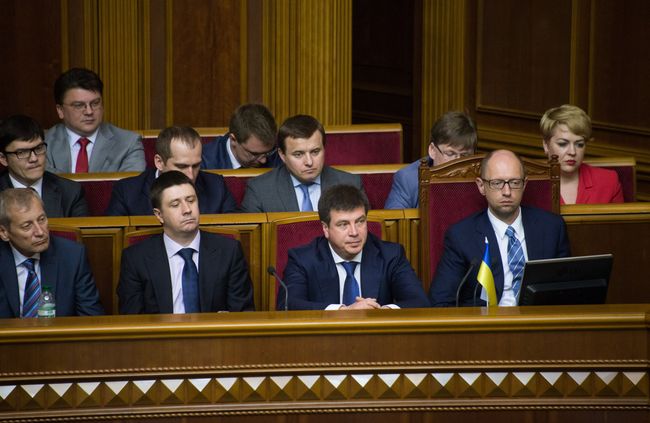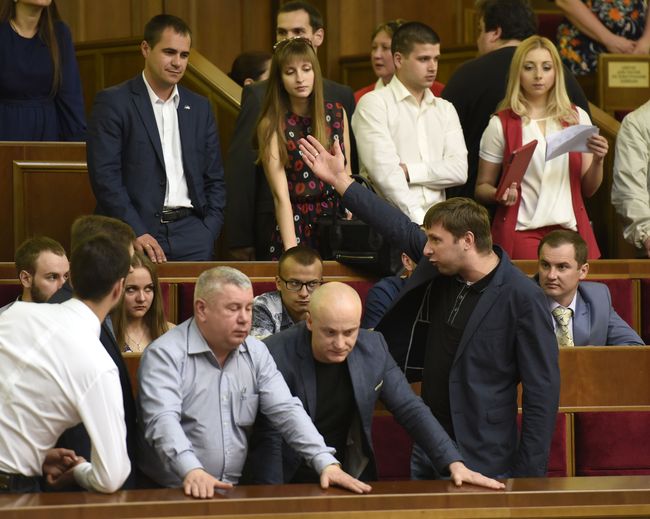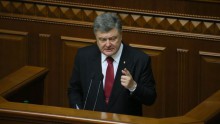On June 4 Ukraine’s President Petro Poroshenko appeared with his annual address “On Ukraine’s International and Domestic Situation in 2015” before the Verkhovna Rada. Given the complicated situation Ukraine finds itself in due to Russia’s aggression and economic troubles, the president’s speech was very timely. Ukrainian society and foreign partners have long been waiting not only for non-standard and timely statements, but also actions.
The president’s speech was preceded by the approving of the Plan of Legislative Support of Reforms, presented by Speaker Volodymyr Hroisman. According to the Speaker, 89 MPs divided into 7 groups had worked on the draft of the Plan, which is based on Strategy 2020, Ukraine-EU Association Agreement and its Implementation Plan, extraordinary Address of the President of Ukraine to the Verkhovna Rada of Ukraine “On Ukraine’s International and Domestic Situation,” as well as on the Program of the Government’s Activities and the Coalition Agreement. “In the framework of the schedule, we need to pass 182 new laws which will regulate these spheres, and more than 300 amendments to various regulatory documents,” added Hroisman, who was followed by the president with his 90-minute address.
However, there was a sort of surprise attack. At the very beginning of Poroshenko’s speech, MPs Andrii Denysenko and Volodymyr Parasiuk tried to hang out a banner in the assistants’ box, with a slogan that was also chanted by Parasiuk: “Sell your Lipetsk factory!” The box was overrun with MPs from the Petro Poroshenko Bloc in no time, so Denysenko and Parasiuk left without completing their mission.
Another escapade was made by Oleh Liashko’s Radical Party members. First, when the president was talking about the reform in the police and army, Liashko booed from his seat. Later he left the session room with almost all members of his faction, but they all returned in less than a minute’s time. Later Liashko told the following to The Day: “We were informed that our colleague Parasiuk was being assaulted. That is why we stood up to help him.” Not only Ukrainians, but also international guests and diplomats witnessed the unsavory scene. What a shame.

THE PRESIDENT PROMISED TO SCRUTINIZE THE PERFORMANCE OF EVERY MINISTER “UNDER A MICROSCOPE” AND REFORMAT THE CABINET AS EARLY AS IN THE FALL / Photo by Mykhailo MARKIV
So, the president’s main messages are as follows.
♦ In March 2014 only some 5,000 or more military were ready to perform missions, and that only in case they could find fuel to get to the front line. Forestalling eventual questions, I will say that now more than 50,000 Ukrainian heroes are defending the country in the anti-terrorist operation zone, while the total strength of Ukraine’s Armed Forces was increased up to 250,000, and today we have the means to defend our Fatherland.
♦ I am often asked if I am pleased with the work of the government. No, I’m not. Am I pleased with the work of the Verkhovna Rada? Neither, obviously. Moreover, I am not pleased with my own work. I should not complain about lack of criticism in the press, but no one criticizes me more heavily than I myself do. Our common goal is to double and triple the efforts for reforms in the country.
♦ The prospect of the visa-free regime has for the first time acquired a fixed place on the agenda. We need not wait long, but we need a spurt for a good finish. All technical tasks must be fulfilled by late August, and in September we expect the last EU assessment mission. And speaking of responsibility: I just got a report that, following my insistent demand, the head of the State Migration Service is dismissed.
♦ Starting on January 1, 2016, the Association Agreement, signed a year ago, begins to function in full.
♦ The large-scale macro-financial help from the IMF and other international organizations, combined with hard, highly unpopular decisions and efficient actions of all branches of power, allowed to avoid default, stabilize the macroeconomic situation and (which is virtually impossible in a country at war) pay out salaries and social benefits on time, slow down recession, and overcome the panic on the currency market.
♦ Gazprom’s era of monopoly and racket is over. And although the Stockholm Arbitration Court will pass a decision on our claim against Gazprom only in 2016, we have already largely cleared up the negative effects of the gas contract of 2009, when the gas price for Ukraine was one and a half to two times as high as for Europe.
♦ In Kyiv, the new road police, created under Eka Zguladze’s supervision, will debut in a couple of weeks and put an end to the notorious racketeering on the roads. We have begun to pass legislation defining the reform of the Ministry of Internal Affairs, separating power-wielding structures from political ones, creating the city guard and the new police. By the way, I see someone like Eka Zguladze as its future head: true, not bound by corrupt ties, and decisive about reforms. But of course, the decision lies with the parliament and government.
♦ According to the Law “On Ensuring the Right to Fair Trial,” new rules of picking judges have been introduced. At last, in a transparent procedure, the Supreme Council of Justice was formed, which will enable a dramatic renewal of the corps of judges.
♦ I certainly support the parliament’s close control of privatization. The more transparent the procedure, the better. No one else but you, people’s deputies, must establish its rules. Also the list of facilities to privatize will be determined by you, on the government’s suggestion. We still have more than 1,800 state-controlled enterprises. Only up to 200 are vital for the state.
♦ The deoligarchization drive will continue from the platform of my self-sufficiency and independence, whatever that might cost me, because Ukraine will not survive without winning this fight.
♦ Parties and factions must only depend on voters, and public funding is a step towards this goal. It is not incidentally that this requirement was included in the anti-corruption package, which we must pass in the framework of visa-free regime, and here I count on the parliament’s support.
♦ We will consider the interim results of the following stage of our joint efforts in the fall. We will scrutinize each government minister’s activities under a microscope. Changing the format of the Cabinet of Ministers is not in my authority. I do not appoint or dismiss ministers and other government officials. But if the coalition does not do it, society could demand changes. However, my fundamental belief is that the changes in the government must only be carried out on condition of preservation of the current coalition and its unity.

THE SCANDAL SOME MPs TRIED TO PROVOKE DURING THE PRESIDENT’S SPEECH ONLY PARTLY SUCCEEDED / Photo by Oleksandr KOSARIEV
How do experts and members of parliament estimate the President’s Address?
“THERE STILL IS THE THREAT THAT ‘OLD’ OLIGARCHS WILL TRY TO GET INTO GOVERNMENT”
Mykhailo HONCHAR, president, Center for Global Studies “Strategy 21”:
“Over this year Ukraine has greatly reduced its energy dependence on Russia and diversified gas supplies from Europe. However, Gazprom’s monopoly on gas supply to our country from the east is still the case. It will only be overcome when other producers supply gas via this route as well. Meanwhile, we do not see this. Russia must grant Central Asian gas suppliers the freedom of transit. Only then can we dismiss Gazprom’s monopoly as overcome. Yet this is a mission for more than one year, even more than several years.
“Speaking of deoligarchization, the president should start from himself, and sell his business at last. Without this, we will hardly see classical gas oligarchs like Firtash transform into ordinary modest businessmen, so common in European countries. Without the president’s deoligarchization it is worthless to expect changes from the rest of the country’s business, because in this case every finger will be pointing at him. Moreover, in this case there still is the threat that ‘old’ oligarchs will try to get into government. Some of them have already voiced their expectations in this respect.”
“THE SPEECH WAS RICH IN CONTENT, EVEN TOO MUCH”
Oleh MEDUNYTSIA, MP, People’s Front:
“The first impression is positive. The president spoke for a long time, he touched upon many questions, which he could have avoided. The speech was rich in content, even too much. It met the goals of the Coalition Agreement and the Euromaidan. The points he mentioned, like deoligarchization, deregulation, and decentralization, were no less important. All this is right, but the words must be filled with real content in Ukrainian politics. I haven’t heard any sensational things from the president, but I would have noticed the announced changes in the government which should have been made long ago, because not only the head of state is unsatisfied with some ministers, but my MP fellows, too. He also recognized that our work is socially unsatisfying, which is evident. Therefore we must continue to fulfill the Coalition Agreement. However, from the practical point of view, it would be more important if Poroshenko said what he expected from the MPs, like voting for the law on local elections and open lists. Otherwise, these are general words.”
“FOR A TOP-LEVEL POLITICIAN THE MOST IMPORTANT THING IS TO TURN WORDS INTO ACTIONS”
Oleksii RIABCHYN, MP, Fatherland:
“My impressions are positive. The speech included many theses that were expected from the president. An unexpected thing was his support of the draft law on state funding of parties. For me it was also important to hear that English will be a compulsive language for state officials. I had waited for a long time for him to speak about the Donbas, because I had been very unsatisfied with the words that a complete blockade of the occupied territories is needed. And I’m not satisfied with the approach voiced by my colleagues, to treat the Donbas as a territory which is inhabited by terrorists. So, I’m glad that the president has a more humane attitude to the residents of this territory, because he knows that many of them are hostages to circumstances. But for a top-level politician the most important thing is to turn words into actions. And, I think, the coalition, the Cabinet of Ministers, and the president are working jointly to reform the country and fulfill our promises before the Ukrainian people. On the whole, what the head of state stated were only messages, and I want to get a more detailed understanding of everything that was said. Of course, the speech included moments that I totally disagree with.”
“UNDERSTANDING OF DISCONTENT OF SOCIETY PROVES THAT THERE IS A PROSPECT OF IMPROVING THIS IN THE FUTURE”
Oleh MUSII, MP, Petro Poroshenko Bloc:
“I think the president’s speech was a positive one, because it made emphasis on all aspects of what had been done and set the priorities for further work. For example, I liked the fact that he called the sphere of health protection one of the top three priorities of reforms. I also think that his self-criticism and the fact that the president is not satisfied with his work are a positive thing – a precedent for Ukraine. The fact that he ascertained this fact proves that he has a critical approach to his actions, among other things. Live reaction and understanding of the discontent of society proves that there is a prospect and effort to improve this in the future.”
“I’M WORRIED BY THE FACT THAT WE HAVE NO COORDINATION BETWEEN THE POLITICAL FORCES AND THE BODIES OF POWER”
Viktoria PTASHNYK, MP, Self-Reliance:
“The president summarized all events and strategies that had been discussed. We have many documents that define what we should do next – the Coalition Agreement, the Presidential Strategy-2020, the approved Plan of Legislative Support of Reforms. Of course, we need such a summary, but I am worried by the fact that we lack coordination between the political forces and the bodies of power – the parliament, the government, and the Presidential Administration. For this there should be a platform to coordinate all of the efforts, because everyone agrees with the main directions of changes in the country: deoligarchization, decentralization, deregulation, etc. And experts must be as well involved in this platform for producing high-quality legislation. For example, recently Oleksandr Paskhaver in his speech at the National Council of Reforms noted that before carrying out the deregulation reforms, we should ask business why it needs it and then carry it out the way business wants. Therefore coordination and involvement of experts are very important, because it will enable the realization of all the directions mentioned by the president.”








